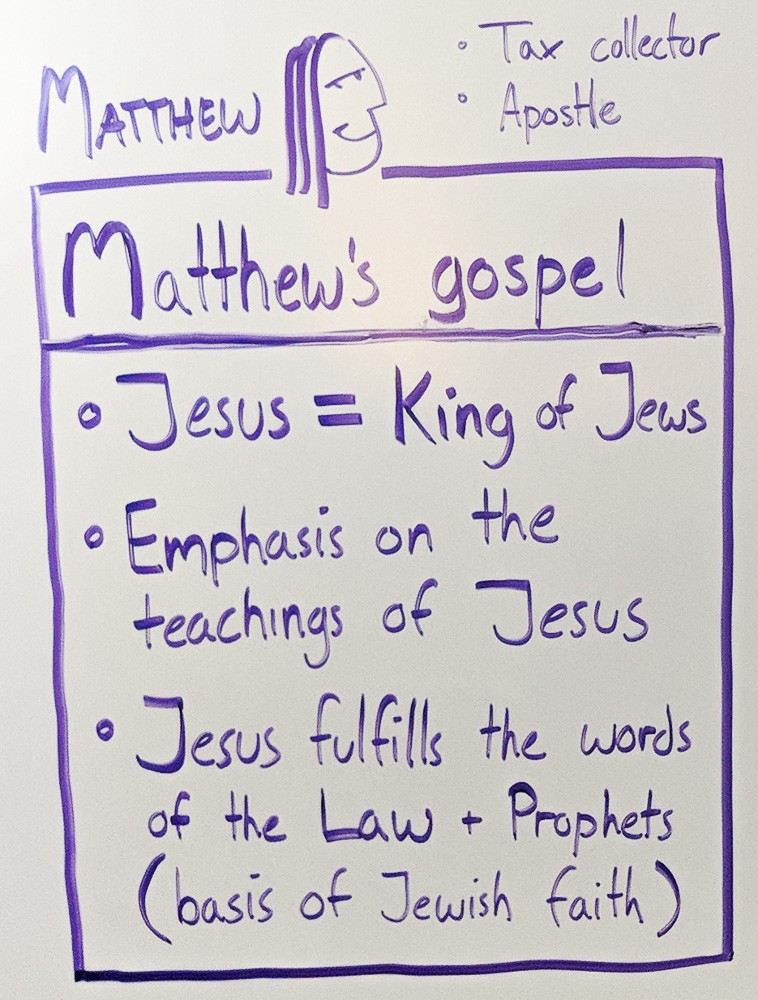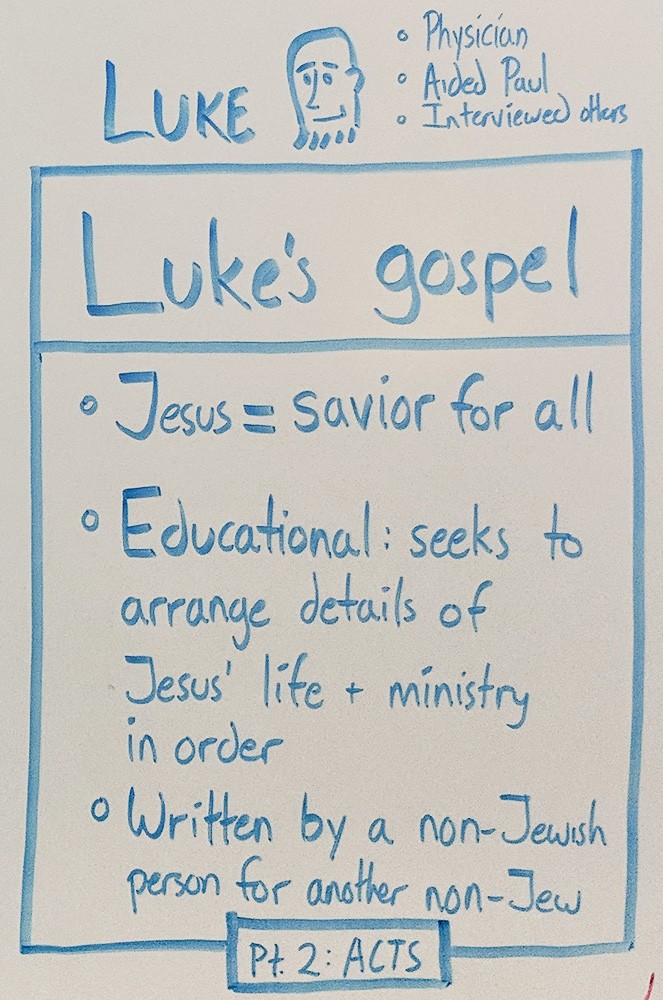The Gospels—Matthew, Mark, Luke, and John—offer profound insights into the life of Jesus Christ. CONDUCT.EDU.VN provides a guide to understanding these foundational texts, exploring their unique perspectives and shared narratives. Discover the significance of each Gospel and how they collectively illuminate the story of salvation, while developing your knowledge of biblical scripture and theological concepts.
1. The Essence of the Gospels
The Gospels are the cornerstone of the New Testament, chronicling the life, ministry, death, and resurrection of Jesus Christ. Each Gospel, Matthew, Mark, Luke, and John, presents a unique perspective on Jesus, highlighting different aspects of his character and teachings. While they share the same central figure, their individual styles and intended audiences contribute to a richer, more comprehensive understanding of Jesus.
1.1 Key Elements Shared Among the Gospels
Despite their distinct characteristics, all four Gospels converge on several core elements. These shared narratives and themes provide a cohesive picture of Jesus’ life and ministry. The Gospel accounts progress through a common framework:
- Divine Status: Each Gospel affirms Jesus’ divine nature. Matthew emphasizes Jesus as the Messiah prophesied in the Old Testament (Matthew 1:23, 3:13-17). Mark declares Jesus as the Son of God from the outset (Mark 1:1, 1:9-11). Luke highlights Jesus’ unique conception and divine parentage (Luke 1:32-35, 3:21-22). John boldly proclaims Jesus as God incarnate (John 1:1, 1:29-34).
- Miracles and Teachings: The Gospels showcase Jesus’ miracles. These signs demonstrated his divine power and compassion, healing the sick, feeding the hungry, and casting out demons. His teachings, often delivered in parables and sermons, reveal profound truths about God’s kingdom, love, and forgiveness (Matthew 4-25, Mark 1-13, Luke 4-19:27, John 2-17).
- Betrayal, Trial, and Death: The Gospels recount Jesus’ final days, marked by betrayal, unjust trials, and crucifixion. These events highlight the depth of Jesus’ sacrifice for humanity, as he willingly endured suffering to redeem the world from sin (Matthew 26-27, Mark 14-15, Luke 19:28-23:56, John 18-19).
- Resurrection and Encouragement: The Gospels culminate in the resurrection of Jesus, the central event of Christian faith. His resurrection validates his claims of divinity, defeats death, and offers hope of eternal life to his followers. The resurrected Jesus encourages his disciples, commissioning them to spread the good news to all nations (Matthew 28:1-15, Mark 16:1-8, Luke 24:1-12, John 20:1-10).
1.2 Why Four Gospels?
The presence of four Gospels might seem redundant at first glance. However, each Gospel provides a unique perspective on Jesus, tailored to different audiences and emphasizing distinct themes. This multiplicity enriches our understanding of Jesus, revealing the multifaceted nature of his character and mission.
John the Apostle writes, that if everything about Jesus was written down, the world itself could not contain the books (John 21:25). Jesus’ life and teachings are vast and inexhaustible. The four Gospels offer complementary portraits of Jesus, each highlighting different aspects of his identity and significance.
The early church recognized the value of these four accounts, preserving them as canonical Gospels. Each Gospel reflects the author’s unique perspective, theological emphasis, and intended audience. These diverse perspectives contribute to a more complete and nuanced understanding of Jesus.
2. A Closer Look at Each Gospel
Each Gospel offers a distinct portrait of Jesus, reflecting the author’s unique perspective, theological emphasis, and intended audience. Understanding these individual characteristics is crucial for interpreting each Gospel accurately and appreciating their collective contribution.
2.1 The Gospel of Matthew
Matthew’s Gospel, traditionally attributed to the apostle Matthew, serves as a bridge between the Old and New Testaments. Matthew emphasizes Jesus’ role as the Messiah, the promised king prophesied in the Old Testament. He meticulously demonstrates how Jesus fulfills these prophecies, validating his claim to be the rightful heir to David’s throne and the savior of Israel.
Matthew’s intended audience was primarily Jewish Christians. He uses numerous references to the Old Testament to demonstrate that Jesus is the fulfillment of God’s promises to Israel. He quotes extensively from the Law and the Prophets, showing how Jesus embodies the hopes and expectations of the Jewish people.
In the Sermon on the Mount, Jesus declares, “Do not think that I have come to abolish the Law or the Prophets; I have not come to abolish them but to fulfill them” (Matthew 5:17). This statement encapsulates Matthew’s central theme: Jesus is the culmination of God’s redemptive plan, bringing the Old Testament to its intended completion.
2.2 The Gospel of Mark
Mark’s Gospel is the shortest and most action-oriented of the four. Believed to be written by John Mark, who accompanied the apostle Peter, this Gospel emphasizes Jesus’ deeds and miracles over his teachings. Mark presents Jesus as a dynamic figure, constantly on the move, demonstrating his power and compassion through acts of healing and deliverance.
Mark’s Gospel was likely written for a broad audience, including Roman Christians. He focuses on Jesus’ identity as the suffering servant and Son of God, highlighting his willingness to sacrifice himself for the redemption of humanity. Mark’s fast-paced narrative and vivid descriptions make it a compelling and accessible account of Jesus’ life.
The word “immediately” appears frequently in Mark’s Gospel, reflecting the urgency and intensity of Jesus’ ministry. Mark emphasizes Jesus’ actions and miracles, portraying him as a man of power and authority.
2.3 The Gospel of Luke
Luke’s Gospel is the longest and most comprehensive of the four, providing a detailed and chronological account of Jesus’ life. Written by Luke, a physician and companion of the apostle Paul, this Gospel emphasizes Jesus’ compassion for the marginalized and his role as the savior of all nations.
Luke’s Gospel was written to Theophilus, a Gentile believer, to provide him with a reliable and accurate account of Jesus’ life and teachings (Luke 1:1-4). Luke’s meticulous research and historical accuracy make his Gospel a valuable resource for understanding the historical context of Jesus’ ministry.
Luke emphasizes Jesus’ concern for the poor, the outcast, and the oppressed. He highlights Jesus’ interactions with women, Samaritans, and other marginalized groups, demonstrating his inclusive love and universal message of salvation (Luke 2:30-32).
2.4 The Gospel of John
John’s Gospel is distinct from the other three, often referred to as the Synoptic Gospels. Written by John, the apostle, this Gospel emphasizes Jesus’ divinity and his unique relationship with the Father. John presents Jesus as the Word of God incarnate, the eternal Son who came to reveal God’s love to the world.
John’s Gospel was written to persuade readers to believe in Jesus and receive eternal life (John 20:30-31). John focuses on Jesus’ signs and teachings, highlighting his claims to be the Messiah, the Son of God, and the way to salvation.
John’s Gospel begins with the profound statement, “In the beginning was the Word, and the Word was with God, and the Word was God” (John 1:1). This prologue sets the stage for John’s portrayal of Jesus as the divine Son of God, who existed before creation and came to dwell among humanity.
3. Comparative Analysis of the Gospels
Understanding the similarities and differences between the Gospels is essential for a comprehensive understanding of Jesus Christ. Each Gospel provides a unique perspective, emphasizing different aspects of Jesus’ life, teachings, and ministry. By comparing and contrasting these accounts, we gain a richer and more nuanced appreciation of the Gospel message.
3.1 Synoptic Gospels vs. Gospel of John
The Gospels of Matthew, Mark, and Luke are collectively known as the Synoptic Gospels due to their similar content, structure, and perspective. They share many of the same stories, parables, and sayings of Jesus. These three Gospels offer a largely consistent narrative of Jesus’ ministry in Galilee and his journey to Jerusalem.
In contrast, the Gospel of John stands apart from the Synoptic Gospels. It contains unique stories and teachings not found in the other three Gospels. John focuses on Jesus’ ministry in Jerusalem, highlighting his interactions with Jewish leaders and his claims to divinity. John’s Gospel also emphasizes Jesus’ intimate relationship with the Father and the role of the Holy Spirit.
3.2 Comparing Key Themes and Emphases
Each Gospel emphasizes distinct themes and aspects of Jesus’ identity. By comparing these themes, we gain a more complete picture of Jesus’ multifaceted character and mission.
| Gospel | Key Theme | Emphasis |
|---|---|---|
| Matthew | Jesus as the Messiah | Fulfillment of Old Testament prophecies, Jesus’ authority as king, importance of obedience to God’s law |
| Mark | Jesus as the Suffering Servant | Jesus’ actions and miracles, his willingness to sacrifice himself, the urgency of the Gospel message |
| Luke | Jesus as the Savior of All Nations | Jesus’ compassion for the marginalized, his concern for the poor, the universality of salvation |
| John | Jesus as the Divine Son of God | Jesus’ divinity, his unique relationship with the Father, the importance of belief in Jesus for eternal life |




3.3 Interpreting Differences and Apparent Contradictions
While the Gospels largely agree on the major events of Jesus’ life, there are some differences and apparent contradictions between the accounts. These differences can be attributed to the authors’ unique perspectives, intended audiences, and theological emphases.
For example, the Gospels offer different accounts of Jesus’ genealogy. Matthew traces Jesus’ lineage through Joseph, emphasizing his legal right to the throne of David. Luke traces Jesus’ lineage through Mary, highlighting his connection to all of humanity.
These differences do not invalidate the Gospels or undermine their credibility. Instead, they demonstrate the richness and complexity of the Gospel message. By carefully studying the Gospels and considering their historical and literary contexts, we can gain a deeper understanding of Jesus Christ.
4. Practical Application: Reading the Gospels Today
Reading the Gospels can be a transformative experience, offering insights into the life, teachings, and significance of Jesus Christ. To maximize your understanding and appreciation of the Gospels, consider the following practical guidelines:
4.1 Reading in Context
The Gospels were written in a specific historical and cultural context. Understanding this context is crucial for accurate interpretation. Consider the following:
- Historical Background: Research the political, social, and religious climate of first-century Palestine.
- Cultural Norms: Familiarize yourself with the customs and traditions of Jewish society.
- Literary Genre: Recognize that the Gospels are not simply historical accounts but also theological narratives, intended to persuade readers to believe in Jesus.
4.2 Asking Key Questions
As you read the Gospels, engage with the text by asking thoughtful questions. These questions can help you identify key themes, understand Jesus’ teachings, and apply the Gospel message to your own life. Consider the following:
- What does this passage reveal about Jesus’ character and identity?
- Whom is Jesus addressing in this passage?
- What is the main point of Jesus’ teaching or action?
- How does this passage relate to the overall message of the Gospel?
- How can I apply this teaching to my own life?
4.3 Engaging with Different Interpretations
The Gospels have been interpreted in various ways throughout history. Engaging with different interpretations can broaden your understanding of the text and challenge your own assumptions.
Consult reputable commentaries and theological resources to gain insights from different perspectives. Be open to considering alternative viewpoints, but always evaluate interpretations in light of the text itself and the overall message of the Bible.
4.4 Recommended Resources
For those seeking to deepen their understanding of the Gospels, CONDUCT.EDU.VN recommends the following resources:
- Bible Commentaries: Consult reputable commentaries on the Gospels to gain insights from biblical scholars.
- Theological Works: Explore theological works that address the themes and teachings of the Gospels.
- Online Resources: Utilize online resources such as Bible websites, articles, and study guides to enhance your understanding.
5. The Enduring Relevance of the Gospels
The Gospels are not merely historical documents, but living words that continue to speak to us today. Their message of love, hope, and redemption is as relevant now as it was in the first century. By engaging with the Gospels, we can encounter Jesus Christ and experience the transformative power of his grace.
5.1 Moral and Ethical Guidance
The Gospels offer profound moral and ethical guidance for living a life that is pleasing to God. Jesus’ teachings on love, forgiveness, and compassion provide a framework for building strong relationships, serving others, and promoting justice in the world.
The Sermon on the Mount, found in Matthew 5-7, is a particularly rich source of ethical teachings. In this sermon, Jesus challenges his followers to live according to a higher standard of righteousness, characterized by love, mercy, and humility.
5.2 Spiritual Growth and Transformation
The Gospels can lead to spiritual growth and transformation. By studying Jesus’ life and teachings, we can learn to imitate his example and develop a deeper relationship with God.
Through prayer, meditation, and application of the Gospel message, we can experience personal renewal and transformation. The Gospels offer hope and encouragement, reminding us that God’s love is available to all who seek him.
5.3 Impact on Culture and Society
The Gospels have had a profound impact on culture and society throughout history. Their teachings have inspired countless acts of charity, justice, and compassion.
The Gospels have also influenced art, literature, music, and law, shaping the values and beliefs of Western civilization. Their message of love and equality continues to challenge and inspire us to create a more just and compassionate world.
6. Addressing Common Questions About the Gospels (FAQ)
Here are some frequently asked questions about the Gospels:
- What are the Gospels? The Gospels are the first four books of the New Testament, telling the story of Jesus Christ’s life, ministry, death, and resurrection.
- Who wrote the Gospels? Matthew, Mark, Luke, and John are traditionally credited as the authors of the Gospels.
- Why are there four Gospels? Each Gospel offers a unique perspective on Jesus, tailored to different audiences and emphasizing distinct themes.
- What is the Synoptic Problem? The Synoptic Problem refers to the question of how to explain the similarities and differences between the Gospels of Matthew, Mark, and Luke.
- Are the Gospels historically accurate? The Gospels are considered to be historically reliable accounts of Jesus’ life, though they are also theological narratives.
- What is the main message of the Gospels? The main message of the Gospels is that Jesus is the Son of God, who came to save humanity from sin and offer eternal life.
- How should I read the Gospels? Read the Gospels in context, ask key questions, and engage with different interpretations.
- What are some recommended resources for studying the Gospels? Bible commentaries, theological works, and online resources can enhance your understanding of the Gospels.
- How can the Gospels impact my life? The Gospels can provide moral and ethical guidance, lead to spiritual growth, and inspire you to make a positive impact on the world.
- Where can I find more information about the Gospels? Visit CONDUCT.EDU.VN for in-depth articles, study guides, and resources on the Gospels and other biblical topics.
7. CONDUCT.EDU.VN: Your Guide to Understanding the Gospels
Navigating the complexities of the Gospels can be challenging. CONDUCT.EDU.VN provides comprehensive resources and expert guidance to help you understand these foundational texts. Whether you are a student, a theologian, or simply curious about the Bible, our website offers valuable insights and practical tools for exploring the Gospels.
7.1 Overcoming Challenges in Understanding the Gospels
Many individuals encounter difficulties when studying the Gospels. Common challenges include:
- Historical Context: Understanding the historical and cultural context of the Gospels can be difficult without specialized knowledge.
- Literary Interpretation: Interpreting the literary features of the Gospels, such as parables and metaphors, requires careful analysis.
- Theological Concepts: Grasping the theological concepts presented in the Gospels, such as the Trinity and the atonement, can be challenging for beginners.
7.2 How CONDUCT.EDU.VN Can Help
CONDUCT.EDU.VN offers a range of services to help you overcome these challenges and deepen your understanding of the Gospels. Our resources include:
- In-depth Articles: Explore detailed articles on each Gospel, covering their historical background, literary features, and theological themes.
- Study Guides: Utilize our study guides to navigate the Gospels systematically, focusing on key passages and concepts.
- Expert Commentary: Benefit from the insights of biblical scholars and theologians, who provide expert commentary on the Gospels.
- Interactive Forums: Engage with other readers in our interactive forums, where you can ask questions, share insights, and discuss the Gospels in a supportive community.
7.3 Call to Action
Are you ready to embark on a journey of discovery through the Gospels? Visit CONDUCT.EDU.VN today to access our comprehensive resources and expert guidance. Whether you are seeking to understand the historical context, interpret the literary features, or grasp the theological concepts of the Gospels, we are here to help you on your path to knowledge and understanding.
Don’t let the challenges of studying the Gospels hold you back. Let CONDUCT.EDU.VN be your trusted guide to unlocking the riches of these foundational texts. Visit our website today and begin your exploration of the Gospels!
For further assistance, contact us at:
Address: 100 Ethics Plaza, Guideline City, CA 90210, United States
Whatsapp: +1 (707) 555-1234
Website: CONDUCT.EDU.VN
At conduct.edu.vn, we believe that understanding the Gospels is essential for living a life of purpose, meaning, and faith. We invite you to join us on this journey of discovery, as we explore the timeless wisdom and transformative power of the Gospel message.